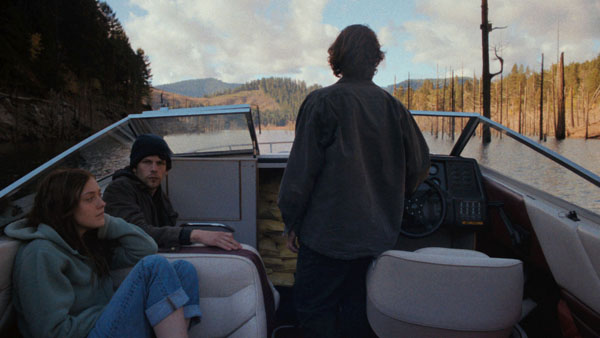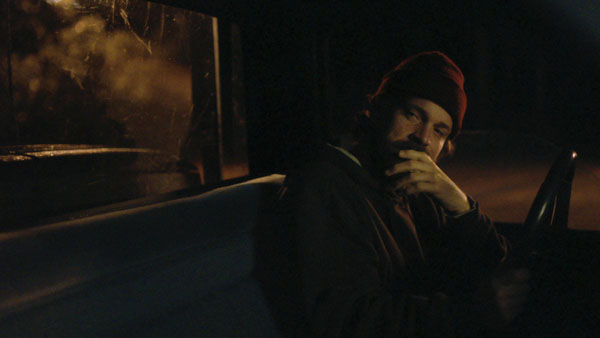“One of the most sharp-eyed and politically attuned filmmakers of her generation, Kelly Reichardt blends her lucid observational approach with a topical-thriller format to engrossing effect in Night Moves,” begins Justin Chang in Variety. “Perfectly consistent with the director’s earlier films in its political dimensions and fascination with nature as both backdrop and subject, this tale of three environmental activists planning a dangerous act of eco-terrorism has a quietly gripping first hour that builds to a suspenseful peak, then yields faintly diminishing returns thereafter as the doubts and implications set in. But if Reichardt doesn’t quite stick the landing, she’s nonetheless made her most accessible, plot-driven picture to date.”
“Reichardt makes it five for five,” agrees Little White Lies‘ David Jenkins. “She initially proffers a fastidious Melvillian crime picture with special attention given to manual processes rather than human drama, but then elegantly pulls the focus back (with the help of a very subtle twist) in the second half to reveal that the caper at the film’s center was only in there for context. And the caper in question is the illegal demolition of a dam residing on a lake in rural Portland, and it’s a job that’s being executed with the use of 200lbs of ammonium fertiliser and a cheap-o speed boat given the hipster legend, ‘Night Moves.’ And—to clear the record—though it has no real relation to the Arthur Penn movie from 1975 with which it shares a title, it does have a similar sense of ’70s-style grit, melancholy and pessimism.”
Night Moves is “a crackling little suspense thriller/morality play indebted to Dostoyevsky and Hitchcock,” finds Oliver Lyttelton, writing for the Playlist. And “while it’s a left turn, it’s at least as good as the films that came before it, and still with the same recognizable DNA intact.” The cast: “Josh (Jesse Eisenberg), who lives on a self-sustaining eco-friendly commune, Dena (Dakota Fanning), from a wealthy background, and Harmon (Peter Sarsgaard), a former Marine.” And Eisenberg’s “a revelation here. Josh is a taciturn sort, but Eisenberg does an enormous amount with what he has, proving to be sinister and vulnerable virtually within the same breath, and expertly putting across the torment he’s going through…. Fanning has seemed to be on her way to a truly attention-grabbing adult turn for a while, and manages it here, entirely convincing as the rich-girl-turned-revolutionary. Sarsgaard is perhaps less surprising, but he’s as solid as ever as the devil on Josh’s shoulder.”
“The expected Kelly Reichardt touches are there,” writes Screen‘s Mark Adams: “beautifully framed tracking shots, a fascination in nature as a striking backdrop (it is closer to her first film Old Joy in that respect) and a series of serious and determined protagonists.” But he finds that “the initially well sustained tense drama is edge-of-the-seat stuff, but ends up being unpicked and diminished by a rather simplistic and oddly unconvincing final third as doubts about what they have done emerge and there are dangerous divisions between these green terrorists.”
He’s not alone. “After a terrific first hour that crescendos in an extended sequence of quiet yet potent white-knuckle suspense, the film loses some traction in the more challengingly paced second half,” writes David Rooney in the Hollywood Reporter. Matt Mueller, too, writing at Thompson on Hollywood, finds that Night Moves is “strongest in its set-up before becoming a tad perplexing and taking a baffling wrong turn at its inconclusive ending.”
Four out of five stars, though, from the Telegraph‘s Robbie Collin; more in French from Jean-Michel Frodon.
Screening in Competition in Venice, Night Movies will be a Special Presentation in Toronto.
Update, 9/1: Reichardt “takes this volatile story and handles it with care and precision, as if transporting unstable nitroglycerin,” writes the Guardian‘s Xan Brooks. “Night Moves, on balance, is the perfect name for a film that walks in shadow; a hushed and coiled thriller in which the characters struggle to find the line between civilization and nature, conviction and crime. The final act arguably pushes the tale into more conventional, even lurid genre territory. But no matter. This director, in the past, has shown herself to be an ace with the teasing, hanging ending and Night Moves saves the best for last.”
Update, 9/3: Jon Frosch from Venice for the Atlantic: “For me, nothing has topped Night Moves, Kelly Reichardt’s disquietingly beautiful, deeply intelligent thriller… Through small, perfectly observed moments, Reichardt (working with screenwriting partner Jon Raymond) suggests that united as they may seem, the main characters have arrived at their extremism from different paths and places: Josh, who rarely thinks out loud or justifies his actions, seems to be the most persuaded of the three; Dena’s anti-establishment, ecologically inclined views may or may not stem from a reflex of rebellion against her privileged upbringing; and Harmon sometimes appears to be torn between revolution and pursuit of pleasure…. Reichardt continues exploring her ideas about the limitations, pressures and dilemmas of American non-conformism. Like most good filmmakers, she discovers more questions than answers. But in the process, she secures her spot as one of the very best US directors working today.”
Updates, 9/4: “Night Moves may not have a particularly focused point of view,” writes the Voice‘s Stephanie Zacharek from Venice. “Reichardt, after all, is the kind of director who will lead us horses right up to the water, then leave us to decide to drink. But if the ending is ambiguous—almost no one here seems to know what it means—it’s also strangely chilling, an instance of pure evil sidling casually into everyday life.”
“The sequence where Dena has to persuade the local dealer to part with 500lb of fertilizer when she doesn’t have sufficient ID gives us a chance to see this superb, restrained and utterly convincing cast working off each other,” writes Sight & Sound editor Nick James. “After that, it’s pure action until the results of the raid are known and the film tips into a different kind of drama, where the consequences of their actions show the trio’s true colors. Some have said it would have made a purer film if Reichardt stuck to the raid, but for me this last film noir-like segment has a devastating accuracy about the thin line between ordinary behavior and the unthinking promulgation of terror.”
Updates, 9/5: In Contention‘s Guy Lodge finds that “the more time Reichardt’s latest has to let its calculatedly flat terrors work on the brain, the more imposing and guileful an achievement it seems. Night Moves is a pretty slow burner while it’s on the screen; off it, it’s stubbornly inextinguishable, the trick birthday candle of this year’s Venice fest.”
“This is Eisenberg’s most introspective performance to date, and taking cues from his performance, the film unfolds with a steady, measured pace,” writes Alexandra Zawia for Cinema Scope.
Updates, 9/11: “Like her anti-Western Meek’s Cutoff, the anti-thriller Night Moves chronicles the unraveling of a group initiative, a blood-chillingly lucid eye cast on doomed outsider ventures,” writes Fernando F. Croce in the Notebook. Reichardt can do classical suspense whenever she wants to: a passage involving a ticking bomb, a canoe and car headlights in the night evokes Hitchcockian montage, clinched later by an unmistakably Hitchcockian shot, a close-up of muddy boots during a police search. What truly fascinates Reichardt, however, are less the mechanics of genre than the mechanics of conscience, a narrative of hard guilt and paranoia leading, in the final shot, into an alien world.”
For Mike D’Angelo, writing at the Dissolve, “this is the first of the movies Reichardt has made with her writing partner, Jon Raymond, in which the characters feel like they’re at the mercy of the narrative rather than driving it… Shocking events occur, but they carry little weight, because they seem imposed from without.”
“Accruing fascinating procedural details en route to its centerpiece, Night Moves eventually becomes a study in guilt and paranoia,” writes A.A. Dowd at the AV Club. “Just as Meek’s fed the conventions of the oater through the director’s distinctly offbeat sensibilities, this new one sometimes feels like her attempt at noir—especially once the threat of getting exposed creates a rift between Eisenberg and Fanning. But it never quite convinces on that front.” Night Moves “works not as a thriller nor a political statement—its ending is typically, and perhaps not beneficially, ambiguous—but as a pure mood piece. To that end, it’s consistently involving, mostly because Reichardt has developed into a master of atmosphere.”
“The last act is a letdown,” finds Ben Kenigsberg, also at the AV Club, “a case of characters who’ve painted themselves into a corner leaving a filmmaker without a way out.”
“To be sure,” writes Kiva Reardon for the Loop, “the film is by no means a positive portrait of radical environmentalism. But it’s no scathing indictment, either. Offering up other examples of eco-resistance like urban farming, Night Moves addresses the politics of patience: it will be slow and we’re going to have to work for it. The same could be said of Reichardt’s film.”
Kristin McCracken interviews Reichardt for Indiewire.
Update, 9/12: For Indiewire‘s Eric Kohn, “what’s especially revealing about the movie in relation to its predecessors is that Reichardt’s deliberate pace actually works in service of suspense, resulting in her most accessible movie to date.”
Updates, 9/17: The eco-terrorists’ “politics disappear in the face of self-preservation, revealing themselves to be less committed environmentalist activists than bored, self-involved anarchists,” writes R. Emmet Sweeney in the L. “They are suitably doomed protagonists for the first sustainable-living-community noir.”
For Nick McCarthy, writing at the House Next Door, “as the story starts to spin its wheels, giving way to a protracted, glacially paced narrative mire that slightly reveals the plot’s flimsiness, it’s the minor details that elucidate most clearly. Reichardt is able to drum up imagery that serves as extraordinarily wry and lucid details captured through insightful glances: a man in a cow suit selling milk on the sidewalk, or a family watching The Price Is Right in their RV while “camping.” Even when framing such images through an ecoterrorism-sympathizing lens, Reichardt tactfully avoids pushing an agenda, neither glamorizing nor condemning activism, instead opting for sensory extrapolation of the protagonist’s Dostoevskian moral dilemma.”
Updates, 9/19: “Meek’s Cutoff was a Western, which is to say perhaps the most instantly recognizable and rigidly codified American genre,” writes Calum Marsh at Film.com, “and yet it derived much of its strangeness from how thoroughly it defamiliarized the tradition, taking the iconography of the West and boiling it down to its barest trace elements. Night Moves, by contrast, finds itself ensconced firmly within the strictures of the classical heist picture, going through the motions of the thriller without any apparent desire to disrupt the genre’s expected pleasures and rhythms…. But while it’s interesting to see a film raise its most important questions and work through its most important themes only in the home stretch, the sense that half the feature has been set up for what is more or less a narrative punchline feels somewhat disingenuous.”
Reichardt “is too intelligent a filmmaker to settle for easy moralizing,” argues Kenji Fujishima at In Review Online. “Perhaps the true measure of the strength of Night Moves as a political film lies in the fact that, for once, we in the audience aren’t entirely sure where the director herself stands on the events she dramatizes and the characters she depicts.”
Update, 9/21: “Cinedigm has snapped up all North American rights,” report Anne Thompson and Beth Hanna.
2013 Indexes: Venice and Toronto. For news and tips throughout the day every day, follow @KeyframeDaily on Twitter and/or the RSS feed. Get Keyframe Daily in your inbox by signing in at fandor.com/daily.







